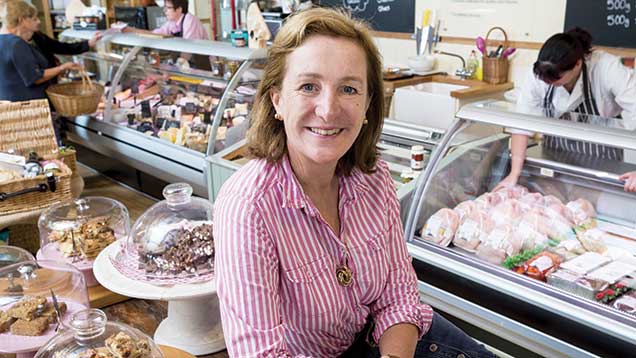Opinion: Government must champion British producers and farm diversifications
 © Jim Varney
© Jim Varney “Get bigger, get different, get out” – wise words indeed, perpetuated by the farming press and encouraged by Defra around 2000 and telling us, as farmers, to diversify.
Human nature ensures that we rarely want to change unless our backs are firmly against the wall. With grain prices so horribly low, along with many other commodities, is it time to think again?
Many farmers become ostriches by burying their heads in the sand.
“We’ll do what we’ve always done, because that’s what we’ve always done”. And farming has traditionally been such a closed shop that discussing possible plans with like-minded people down the pub is nigh on impossible.
The Worshipful Company of Farmers run an annual course aimed at forcing participants to take a long, hard look at their businesses and really assess where any profit is coming from.
The current husband went on the course in 1997. Most of his course year has taken the advice, including building office space and light industrial units, adding value to potatoes, getting into property development or leaving the industry. He came back open to change.
The French farmers are revolting (they’re certainly no ostriches) and I can’t help but admire their spirit.
“We don’t need to burn tyres on motorways or block up London’s bridges with livestock, we just need to convince not only the British to buy British, but other European countries, too” – Sally Jackson
I don’t always agree with their methods but you have to admit, in this case, they recently got results in the form of an extra £428m from the French government.
I noticed that the NFU was asking British farmers to remain calm, but should we really? It doesn’t seem to have got us very far.
The oversupply of milk is being blamed for low milk prices but the national milk herd declined by 45% between 1980-2013.
Some oversupply has undoubtedly been caused by increased efficiencies and milk production per cow but the vast oversupply can only be blamed on imports and decreasing exports.
We don’t need to burn tyres on motorways or block up London’s bridges with livestock, we just need to convince not only the British to buy British, but other European countries, too.
We could tell those dairy farmers to add value to their product by making cheese or ice cream or yoghurt, which many have done with great success, but the same reasoning applies – marketing.
We need an army of dairy farmers to go into supermarkets every week, on a rota system, to give out tasters of British milk and explain why we should buy British.
The first supermarket to champion British milk instead of using it as a loss leader will win hearts.
The biggest supporters of local and British are the real farm shops.
In ours, we stock only British cheese – although occasionally we get asked for Roquefort or Brie de Meaux, we can usually convince them to try something British instead.
There are more and more farm shops springing up all over the country.
It is hard to make a go of a standalone farm shop though, unless you are in a cracking, main road location surrounded by yummy mummies and Waitrose customers, which is why most of us have diversified into restaurants, cafés, farm attractions and retail outlets.
In a recent, incredibly unscientific survey, I asked a number of farm shop owners how sales were going this year.
The vast majority were optimistic, claiming a slight increase in turnover (unlike the majority of the middle-range supermarkets).
However, this could all go horribly wrong when the living wage comes in next year and the minimum wage increases by 10% next year, in addition to us starting to pay pension contributions.
I do agree that businesses should not be subsidised by benefits to the least well-off but a jump of 10% will nigh on kill any plans for growth and further employment as other staff demand an equal pay rise.
The government should be celebrating both the British producers and the diversifications that they encouraged us to do back in the 1990s, along with all the small- and medium-sized businesses in this country which provide the majority of jobs.
As we start to come out of recession, many farmers are looking to diversify further and ensure the future of the countryside.
One wrong step by the government and further development and diversification goes down the pan.
On a lighter note, I was on the train back from London a few weeks ago with some ladies from the original rural diversification, the Women’s Institute (WI).
They were regaling the carriage with tales of meeting the Queen at her garden party.
As they left the train, a smart young man, suited and booted, straight out of his London office, told me that the highlight of his life so far had been baking a Victoria sponge that stole “best in show” from all the WI ladies at his local village fête.
Maybe the WI could come on board to support the milk producers… a formidable force indeed.
Sally and husband Andrew farm 364ha just outside Scunthorpe in north Lincolnshire. They have a farm shop, The Pink Pig Farm (a former winner in the diversification category of the Farmers Weekly Awards), with a 90-seater café and farm trail. Sally is chairman of the Farmers’ Retail and Markets Association (Farma).
